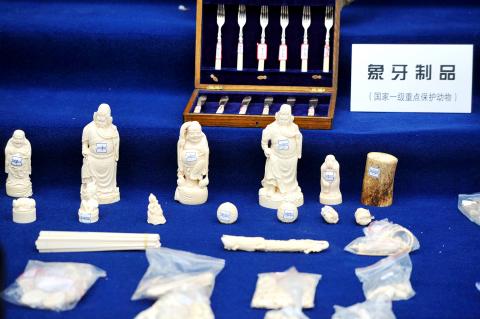Chinese diplomatic and military staff went on buying sprees for illegal ivory while on official visits to Tanzania, sending prices soaring, an environmental activist group said yesterday.
Tens of thousands of elephants are estimated to be slaughtered in Africa each year to feed rising Asian demand for ivory products, mostly from China, the continent’s biggest trading partner.
When Chinese President Xi Jinping (習近平) visited Tanzania last year, members of his government and business delegation bought so much ivory that local prices doubled to US$700 per kilogram, the UK-based Environmental Investigation Agency (EIA) said in a report, citing ivory traders in Dar es Salaam.

Photo: AFP
“When the guests come, the whole delegation, that’s then time when the business goes up,” the EIA quoted a vendor named Suleiman as saying.
They alleged that the buyers took advantage of a lack of security checks for diplomatic visitors to smuggle their purchases back to China on Xi’s plane.
Similar sales were made on a previous trip by former Chinese president Hu Jintao (胡錦濤), the report said, and Chinese embassy staff were also described as “major buyers.”
A Chinese navy visit to Tanzania last year by vessels returning from anti-piracy patrols in the Gulf of Aden “prompted a surge in business for Dar es Salaam-based ivory traders,” it said.
A Chinese national named Yu Bo was arrested during the naval visit as he attempted to enter Dar es Salaam port in a truck containing 81 elephant tusks — hidden under wooden carvings — which he planned to deliver to two mid-ranking Chinese naval officers, the EIA said.
Yu was convicted by a local court in March and sentenced to 20 years in jail, it added.
Tanzania is a key ally of China in East Africa and Tanzanian President Jakaya Kikwete reportedly signed deals worth US$1.7 billion on a visit to Beijing last month.
Tanzania had about 142,000 elephants when Kikwete took office in 2005, the EIA said, adding that by next year, the population is likely to have plummeted to about 55,000 as a result of poaching.
Almost all ivory sales were banned in 1989 by the Convention on International Trade in Endangered Species of Wild Fauna and Flora (CITES), to which both China and Tanzania are signatories.
China often says that it pays “great attention” to the protection of endangered wildlife, and in recent years has carried out several high-profile arrests of smugglers caught in its territory, along with a televised incineration of seized ivory.
The environmental group WWF estimated that about 25,000 African elephants were hunted for ivory in 2011, predicting that the toll would rise.
There could be as few as 470,000 left, it said.

INVESTIGATION: The case is the latest instance of a DPP figure being implicated in an espionage network accused of allegedly leaking information to Chinese intelligence Democratic Progressive Party (DPP) member Ho Jen-chieh (何仁傑) was detained and held incommunicado yesterday on suspicion of spying for China during his tenure as assistant to then-minister of foreign affairs Joseph Wu (吳釗燮). The Taipei District Prosecutors’ Office said Ho was implicated during its investigation into alleged spying activities by former Presidential Office consultant Wu Shang-yu (吳尚雨). Prosecutors said there is reason to believe Ho breached the National Security Act (國家安全法) by leaking classified Ministry of Foreign Affairs information to Chinese intelligence. Following interrogation, prosecutors petitioned the Taipei District Court to detain Ho, citing concerns over potential collusion or tampering of evidence. The

Seventy percent of middle and elementary schools now conduct English classes entirely in English, the Ministry of Education said, as it encourages schools nationwide to adopt this practice Minister of Education (MOE) Cheng Ying-yao (鄭英耀) is scheduled to present a report on the government’s bilingual education policy to the Legislative Yuan’s Education and Culture Committee today. The report would outline strategies aimed at expanding access to education, reducing regional disparities and improving talent cultivation. Implementation of bilingual education policies has varied across local governments, occasionally drawing public criticism. For example, some schools have required teachers of non-English subjects to pass English proficiency

‘FORM OF PROTEST’: The German Institute Taipei said it was ‘shocked’ to see Nazi symbolism used in connection with political aims as it condemned the incident Sung Chien-liang (宋建樑), who led efforts to recall Democratic Progressive Party (DPP) Legislator Lee Kun-cheng (李坤城), was released on bail of NT$80,000 yesterday amid an outcry over a Nazi armband he wore to questioning the night before. Sung arrived at the New Taipei City District Prosecutors’ Office for questioning in a recall petition forgery case on Tuesday night wearing a red armband bearing a swastika, carrying a copy of Adolf Hitler’s Mein Kampf and giving a Nazi salute. Sung left the building at 1:15am without the armband and apparently covering the book with a coat. This is a serious international scandal and Chinese

TRADE: The premier pledged safeguards on ‘Made in Taiwan’ labeling, anti-dumping measures and stricter export controls to strengthen its position in trade talks Products labeled “made in Taiwan” must be genuinely made in Taiwan, Premier Cho Jung-tai (卓榮泰) said yesterday, vowing to enforce strict safeguards against “origin laundering” and initiate anti-dumping investigations to prevent China dumping its products in Taiwan. Cho made the remarks in a discussion session with representatives from industries in Kaohsiung. In response to the US government’s recent announcement of “reciprocal” tariffs on its trading partners, President William Lai (賴清德) and Cho last week began a series of consultations with industry leaders nationwide to gather feedback and address concerns. Taiwanese and US officials held a videoconference on Friday evening to discuss the